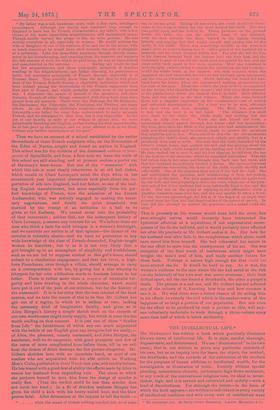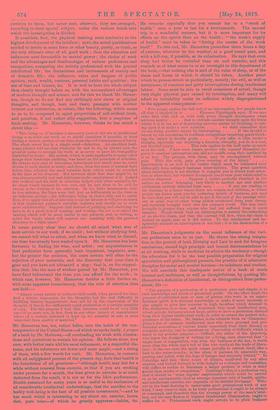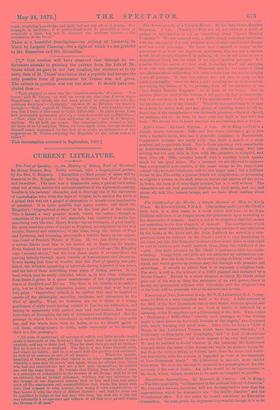THE INTELLECTUAL LIFE.* Ma. HAmEnToN has written a book which
peculiarly illustrates his own views of intellectual life. It is clear, careful, thorough, dispassionate, and disinterested. We use " disinterested " in his own sense ; that is, not written to prove any particular crotchets of his own, but as an inquiry into the bases, the object, the method, the drawbacks, and the rewards of the cultivation of the intellect for the purposes of honest addition to intellectual wealth, for the investigation or illustration of truth. Entirely without special pleading, meretricious rhetoric, enthusiastic high-flown sentiment, or any touch of the conventional religious tone, its ideal is, never- theless, high, and it is earnest and cultivated and orderly—with a kind of disorderliness. For although the letters—in the form of which the book appears—are written to individuals in every variety of intellectual condition and with every sort of intellectual want
The Intellectual Life. By Philip Gilbert Ilamerton, London: Macmillan & Co.
(written to them, but never sent, observe), they are arranged, according to their special subject, under the various heads into which the investigation is divided.
It considers, first, the physical training most conducive to the highest development of the intellect ; next, the moral qualifications needed to insure in some form or other beauty, purity, or truth, as the only ultimate aims of all good work ; then the education and influences most favourable to mental power ; the choice of work and the advantages and disadvantages of various professions and occupations, comparing the strictly professional with the general intellectual life ; the distractions and incitements of society and of domestic life ; the influence, value and dangers of public opinion, rank, wealth, customs, personal habits and qualities ; the use of time and leisure, &c. It is well to have the whole subject thus clearly brought before us, with the accumulated advantages of modern thought and science, and for this we thank Mr. Hamer- ton, though we do not find any strikingly new views or original thoughts, and though, here and there, passages with neither interest nor instruction, or others, like the following, which seems to us to be composed in equal proportions of self-evident truth, and pointless, if not rather silly suggestion, hint a suspicion of book-making. Mr. Hamerton, however, thinks he has seized a clever idea :—
" This being so, it becomes a necessary part of the art of intellectual living so to order our work as to shield ourselves if possible, at least during a certain portion of our time, from the evil consequences of hurry. The whole secret lies in a single word—Selection. An excellent land- scape painter told me that whatever he had to do, he always took the greatest pains to arrange his work so as never to have his tranquillity disturbed by haste. His system, which is quite applicable to many other things than landscape painting, was based on the principle of selection. He always took care to determine beforehand how much time he could devote to each sketch or study, and then, from the mass of natural facts before him, selected the most valuable facts which could be recorded in the time at his disposal. But however short that time might be, he was always perfectly cool and deliberate in the employment of it. Indeed this coolness and his skill in selection helped each other mutually, for he chose wisely because he was cool, and he had time to be cool by reason of the wisdom of his selection. In his little memoranda, done in five minutes, the lines were laid just as deliberately as the tints on an elaborate picture ; the difference being in choice only, not in speed. Now, if we apply this art of selection to all our labours it will give us much of that landscape painter's enviable coolness, and enable us to work more satisfactorily. Suppose that instead of painting and sketching we have to do a great deal of reading and writing : the art is to select the reading which will be most useful to our purpose, and, in writing, to select the words which will express our meaning with the greatest clearness in a little space."
It seems pretty clear that we should all select what was of most service to our work, if we could ; but without studying first, we cannot tell what to select, and when we know what to discard, our time has already been wasted upon it. Mr. Hamerton has been fortunate in finding his wise, cool artist ; our acquaintances in that profession have generally been impatient, impulsive men ; but the greater the coolness, the more certain will often be the rejection of your materials, and the discovery that your time is gone and you have not advanced a step ; that is, on the supposi- tion that, like the man of wisdom quoted by Mr. Hamerton, you have fixed beforehand the time you can afford for the work ; in which case, however, Mr. Hamerton decides a little further on, with some apparent inconsistency, that the rule of selection does not hold:—
" Almost every author of ordinary skill could, when pressed for time, find a briefer expression for his thoughts, but the real difficulty in fulfilling literary engagements does not lie in the expression of the thought, it lies in the sufficiently rapid production of a certain quantity of copy. For this purpose I fear that selection would be of very little use—of no more use, in fact, than in any other branch of manufacture where (if a certain standard is kept up to) quantity in sale is more important than quality of material."
Mr. Hamerton has, too, rather fallen into the habit of his con- temporaries of the United States—of which we spoke lately, a propos Of a book by Dr. Mathews,—of overloading his work with illustra- tions and quotations to sustain his opinion. He follows them, how
ever, with better taste add his usual refinement, at a respectful dis- tance, and his references are fewer and more ample,—not a string of them, with a few words for each. Mr. Hamerton, in common with all enliglitened persons of the present day, feels that health is the foundation of all greatness—" although health may last for a while without renewal from exercise, so that if you are working under pressure for a month, the time given to exercise is so much deducted from the result, it is not so for the life's performance.- Health sustained for many years is so useful to the realisation of all considerable intellectual undertakings, that the sacrifice to the bodily well-being is the beat of all possible investments,"—and he has much which is interesting to say about air, exercise, hours, diet, pure wine—of which he greatly approves—habits, &c.
He remarks especially that you cannot lay in a "stock of health" once a year to last for a twelvemonth. The annual trip is a wonderful restorer, but it is more important for its effects on the spirits than on the health ; "the week's supply of health" must be taken in "during the course of the week itself." To this end, Mr. Hamerton prescribes three hours a day of exercise,- whatever be the weather, at a good round pace, and with a hill-top, if possible, as its culmination. He says that even sleep had better be curtailed than air and exercise, and this reminds us of what seems to us an oversight in this department of the book,—that nothing else is said of the value of sleep, or of the times and hours at which it should be taken. Another point which he presses struck us particularly, namely, the evil, as well as annoyance, of constant and petty interruptions during intellectual labour. Some must be able to recall sensations of actual, though very slight physical pain caused by interruption, and many will admit an irritability under its infliction widely disproportioned to the apparent consequences :— " Few people realise the full evil of an interruption, few people know all that is implied by it Florence Nightingale says, 'If we con- sider that with sick as with well, every thought decomposes some
nervous matter that to obtrude another thought upon the brain whilst it is in the act of destroying nervous matter by thinking, is call- ing upon it to make a new exertion we shall remember that we are doing positive injury by interrupting If the invalid is
forced by his avocations to continue occupations requiring much think-
ing, the injury is doubly great If you offer it (the brain) a thought, especially one requiring a decision, abruptly, you do it a real,
not fanciful injury This rule applies to the well quite as much as to the sick. I have never known persons who exposed themselves for years to constant interruption who did not muddle away their intellects by it at last. The process, with them, may be accomplished without
pain. With the sick, pain gives warning of the injury.' Interruption is an evil to the reader which must be estimated very differently from ordinary business interruptions. The great question about interruption is not whether it compels you to divert your atten- tion to other facts, but whether it compels you to tune your whole mind to another diapason Suppose a reader perfectly absorbed in his author, an author belonging very likely to another age and another
civilisation entirely different from ours if you are reading in the daytime in a house where there are women and children, or where people can fasten upon you for pottering details of business, you may be sure that you will not be able to get to the end of the passage with- out in FOMO way or other being rudely awakened freau your dream, and suddenly brought back into the common world. The loss intel- lectually is greater than anyone who had not suffered from it could imagine. People think that an interruption is merely the unhooking of an electric chain, and that the current will flow, when the chain is hooked on again, just as it did before. To the intellectual and im- aginative student an interruption is not that ; it is the destruction of a picture."
Mr. Hamerton's judgments on the moral influence of the vari- ous professions seem to us just. He shows the strong tempta- tion in the pursuit of both Divinity and Law to seek for foregone conclusions, should high principle and honest disinterestedness be at all wanting, while in medicine he admits the tendency—though the education for it be the best possible preparation for original speculation and philosophical pursuits, the practice of it admirable discipline for moral and mental heroism—to indolence and routine. We will conclude this inadequate notice of a book of much interest and usefulness, as well as thoughtfulness, by quoting Mr. Hamerton's definition of intellectual, as distinguished from profes- sional, life :— " The purpose of a profession, of a profession pure and simple, is to turn knowledge and talent to pecuniary profit. On the other hand, the purpose of cultivated men, or men of genius, who work in an unpro- fessional spirit, is to increase knowledge, or make it more accurate, or else simply to give free exercise to high faculties which demand it. The distinction is so clear and trenchant that most intellectual men, whore private fortunes are not large, prefer to have a profession distinct from their higher intellectual work, in order to secure the perfect inde- pendence of the latter. Mr. Smiles, in his valuable book on Character,' gives a list of eminent intellectual men who have pursued real pro- fessional avocations of various kinds separately from their literary or scientific activity, and he mentions an observation of Gifford's which is much to my present purpose Gifford, the editor of the Quarterly, who knew the drudgery of writing for a living, once observed that 'a single hour of composition, won from the business of the day, is worth more than the whole days toil of him who works at the trade of litera- ture: in the one case, the spirit comes joyfully to refresh itself, like a hart to the water-brooks ; in the other, it pursues its miserable way, panting and jaded, with the dogs of hunger and necessity behind.'" So Coleridge said that three hours of leisure, unalloyed by any alien anxiety, and looked forward to with delight as a change and recreation, will suffice to realise in literature a larger product of what is truly genial than weeks of compulsion." Coleridge's idea of a profession was, that it should be 'some regular employment which could be carried on so far mechanically, that an average quantum only of health, spirits, and intellectual exertion are requisite to its faithful discharge.' With- out in the least desiring to undervalue good, professional work of any kind, I may observe that, to be truly professional it ought to be always at command, and therefore that the average power of the man's'intel- lect, not his rare flashes of highest intellectual illumination, ought to suffice for it. Professional work ought always to be plain business
work, requiring knowledge and skill, but not any effort of genius. For example, in medicine, it is professional work to proscribe a dose or amputate a limb, but not to discover the nervous system or the circulation of the blood."
There is a beautiful frontispiece—an etching of Leonardo da Vinci by Leopold Flameng—for a sight of which we are grateful to Mr. Hamerton and Mr. Macmillan.




































 Previous page
Previous page